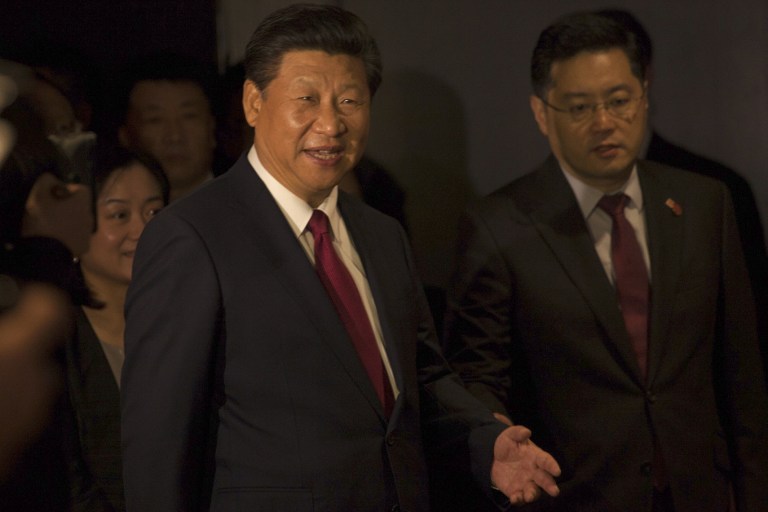President Xi Jinping compared China’s economy to a giant ship sailing in stormy seas, the Wall Street Journal reported Tuesday, but Xi was confident it was moving in the right direction.
Xi, who begins his first state visit to the United States later Tuesday, said a long-term view was essential to understanding the world’s second-largest economy as he seeks to ease global worries over its performance.
“If you liken it to a large ship on the sea, the question you ask is whether it is sailing in the right direction, does it have sufficient engine power and energy to stay long,” he said, part of lengthy written responses to questions submitted by the newspaper.

“Any ship, however large, may occasionally get unstable sailing on the high sea,” he said, adding he was confident investor confidence would be restored.
“Against the overall global economic backdrop, many countries have encountered difficulties,” he said. “The Chinese economy is also under a downward pressure. But it is a problem in the course of progress.”
Concerns over how much China’s economic growth is slowing have helped fan domestic and global stock market volatility and raised questions over the ability of Xi and other top leaders to manage a delicate transition to a consumer-focused economic model.
China’s economy expanded 7.3 percent last year, the weakest pace since 1990, and slowed further to 7.0 percent in each of the first two quarters this year.
Data generally regarded as weak in the current third quarter have raised alarm bells over the extent of the slowdown, which has serious implications for the global economy.
“The Chinese economy is still operating within the proper range,” Xi said.
He also defended government actions to prop up plunging share markets, widely seen by analysts as having failed.
“The Chinese government has taken some measures to defuse systemic risks,” he said. “Such steps have proved successful.”
– Freedom is order -The Wall Street Journal submitted its questions to China’s foreign ministry and officials “pulled together facts and research for the answers”, the paper said, before Xi “revised and reviewed them”.
Days after presiding over a huge military parade in Beijing, Xi reiterated that China and its rising defence capabilities — including anti-ship ballistic missiles — do not pose a regional or global threat.
He also explicitly denied foreign allegations that Beijing steals corporate information online “in any form”, or encouraged Chinese companies to do so.
“Cybertheft of commercial secrets and hacking attacks against government networks are both illegal; such acts are criminal offences and should be punished according to law and relevant international conventions.”

Asked about Chinese restrictions on the Internet as well as a proposed law to restrict foreign non-profit organisations, Xi emphasised the need to balance the flow of information with legal norms.
“Freedom and order must be upheld side by side in both cyberspace and the physical world,” he said. “Freedom is the purpose of order, and order the guarantee of freedom.”
Chinese leaders stress the importance of social stability over individual rights in a nation of 1.37 billion, whereas the latter is a US founding principle.
Quoting the ancient Chinese philosopher Mencius — “It’s only natural for things to be different” — Xi suggested that differences must be accepted.
“With so much difference in ethnicity, history, culture, religion, social system, development level and lifestyle, there are things about others that one may find hard to understand.”
